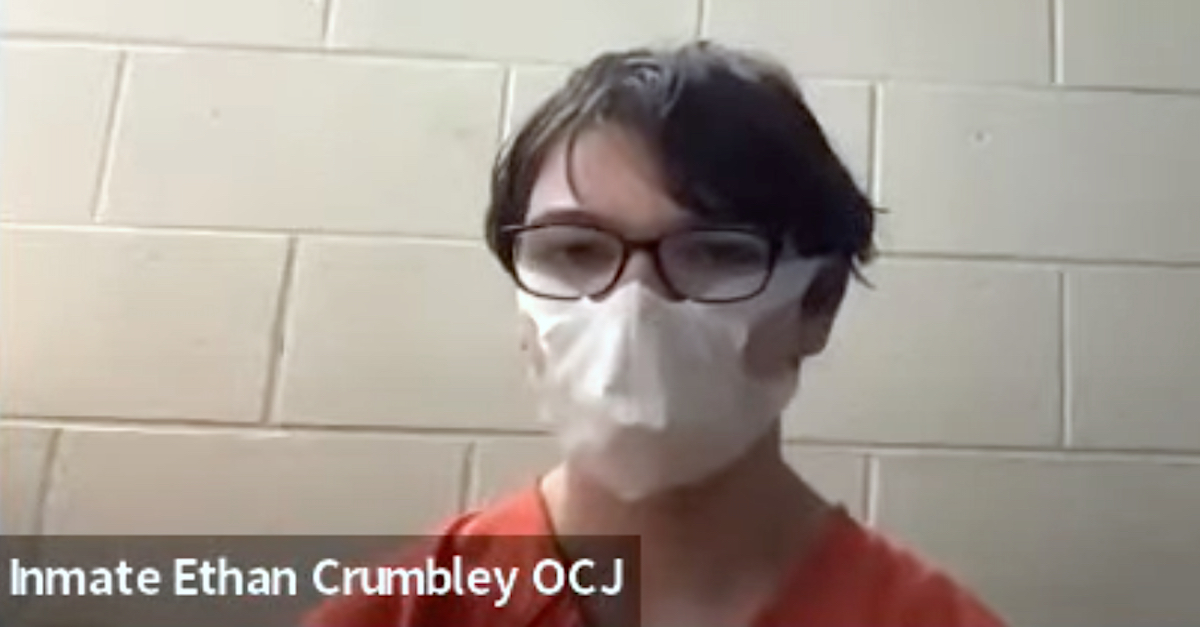
Ethan Crumbley appears in court via a Zoom videoconference on Dec. 13, 2021. (Image via screengrab from Michigan’s 52nd District Court – Division 3 by way of the Law&Crime Network.)
A Michigan judge on Monday declined requests from defense attorneys and from a guardian ad litem to move accused school murderer Ethan Crumbley out of a county jail and into a juvenile facility.
“I’m not being humorous when I say this, but he could still at least be in school,” said Deborah H. McKelvy, who is Crumbley’s guardian ad litem, to Judge Nancy T. Carniak during a probable cause conference. “I mean, there are things — he is still 15 years of age. There are certain things — many things — he’s not going to get at the jail. I’m imploring you, on behalf of him, and what’s in his best interest that we allow him to go back to the village.”
McKelvy and Crumbley’s defense attorneys, Amy Hopp and Paulette Loftin, were asking the judge to move the teen who is accused of murdering four people into the Oakland County Children’s Village. A judge previously determined that the alleged teen killer belonged in a county jail.
Loftin said the the school shooting was “one, isolated incident” and that her client had never been in trouble before he was accused of murdering Hana St. Juliana, 14, Tate Myre, 16, and Madisyn Baldwin, 17, at Oxford High School on Nov. 30. A fourth teen, Justin Shilling, 17, died the next morning from injuries sustained during the attack; Crumbley is also accused of murder in that case. Others were injured.
“I honestly do not believe that my client should be considered a menace to other juveniles,” Loftin continued in her bid to have Crumbley moved to the juvenile facility. “This is someone who has never been in trouble before. This is not someone who has a history of assaulting kids his age or any other negative contact with his peers.”
“I believe we are violating that statute,” she continued while referencing Michigan laws and court rules that set forth the parameters of juvenile detentions in adult facilities. Specifically, Loftin and Crumbley’s other advocates said the defendant could hear adult inmates from his current jail cell.
“I’m not sure that he is fully away from the sounds of the adult inmates, and pursuant to the court rule, basically — um — 6.909 — um — there really has to be an assessment that he is either considered a menace to other juveniles or cannot otherwise be safely be detained in a juvenile facility,” McKelvy, the GAL, said. “I understand the severity of what occurred. I think everybody does, including Mr. Crumbley, but I don’t know simply indicating because the victims were of his age that he would necessarily be a menace.”
McKelvy said a move would benefit Crumbley’s “mental and emotional well-being.” She said he was “not able to benefit fully” from programs at the county jail and would have “greater human contact and services” at the Children’s Village.
Joined by prosecutor Kelly Collins, prosecutor Marc Keast rebutted the glowing references the Crumbley advocates made on the defendant’s behalf.
“This cannot be compared to any other case that this court or any court in this county has seen before,” Keast said. “Calling this an isolated incident, quite frankly, does not do it justice. This was a mass murder at a school, judge. This was planned. It was premeditated.”
Keast said Crumbley’s “food intake” and “weight” were both monitored. He said any attempt to move the teen should be made by a written motion. He said that should the defense make such a motion, he would ask the court “to review, in camera, the Oxford High School video that does in fact prove beyond any doubt that this defendant is the individual who perpetrated this offense on other children.”
The prosecutor then said the Children’s Village was “not a secure facility” and has “had escapes in the recent past.”
Keast said he “could not imagine” placing Crumbley in a “school environment” given the litany of charges that accuse the defendant of perpetrating a deadly attack at a high school.
Judge Carniak said she considered Crumbley’s placement “appropriate” but did have concerns about whether the defendant was able to hear adult prisoners from his cell.
Keast said he would place a call immediately to the jail to ensure that the defendant was being properly segregated from the adult jail population.
“I will make sure the defendant is neither in sight or sound with any other adult at the jail,” the prosecutor promised the judge.

Though the bulk of the hearing discussed the defendant’s pretrial incarceration, the beginning of the proceeding focused on discovery matters.
Keast said 500 pages of documents were turned over to the defense and that more was on its way.
“This is an extremely unique circumstance,” Keast said. “The number of these children who were at the school were victimized and traumatized themselves,” he explained, was large. Interviews were taking considerable time. A flash drive of an additional 340 items, including in-car video, presumably from a police cruiser, and additional recorded witness interviews were “all things we will turn over to the defense,” Keast continued.
“The reports are continuing to come in,” he again noted while discussing the time needed for law enforcement officers to expand the scope of the investigation.
Crumbley spoke but a few times — and tersely while so doing — during the hearing.
“Yes, ma’am,” Crumbley said when the judge asked if he was comfortable waiving the 21-day requirement for a preliminary examination under Michigan law.
Crumbley’s attorneys said they were comfortable waiving the strict deadline so they could review the discovery as prosecutors received it and handed it over.
A probable cause examination which was scheduled for Dec. 20, 2021 at 1:15 p.m. was pushed back to Jan. 7, 2022, at 9:00 a.m.
Watch the hearing below:
Read Crumbley’s charging documents here: